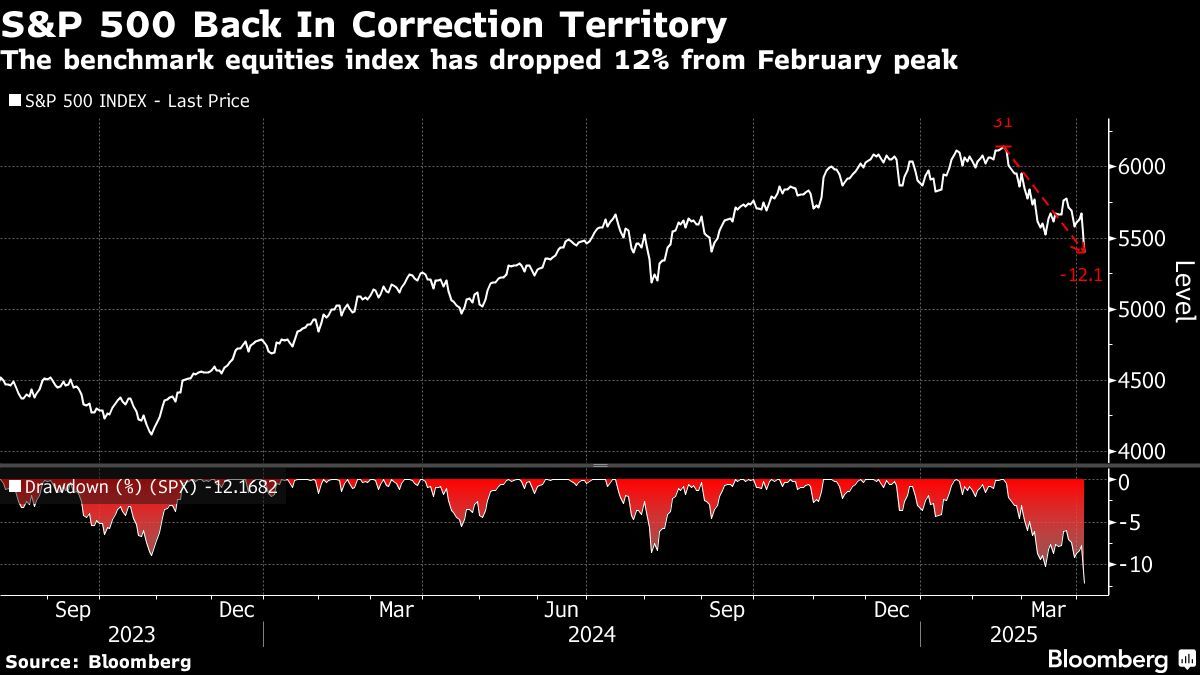
UBS Global Wealth Management warned of prolonged market volatility due to the impact of reciprocal tariffs on the world’s largest economy and has reduced US stocks to neutral from attractive. It slashed its year-end target for the S&P 500 Index to 5,800 from 6,400 due to lower earnings estimates and valuation.
(April 4): UBS Global Wealth Management downgraded US equities, warning of prolonged market volatility due to the impact of reciprocal tariffs on the world’s largest economy, and far-reaching implications for global growth.
The firm reduced US stocks to neutral from attractive, and slashed its year-end target for the S&P 500 Index to 5,800 from 6,400 due to lower earnings estimates and valuation. The new forecast still implies a 7.5% gain from Thursday’s close.
“The extent of the announced tariffs has surprised both us and the market more broadly,” Chief investment officer Mark Haefele wrote in a note dated on April 3. Markets will be “volatile amid potential tit-for-tat escalation in tariffs, Section 232 investigations, which could lead to further US tariffs, and likely consensus earnings and economic downgrades,” he added.
The downgrade underscores growing concerns that President Donald Trump will continue with his trade policies despite a higher chance of a recession in the world’s largest economy. US stocks — which Trump often uses as a scorecard for success — suffered their worst day in five years on Thursday after the tariff announcement.
UBS Global Wealth joins a growing list of analysts — including those from Goldman Sachs Group Inc and Societe Generale — who have slashed targets on the S&P 500 gauge since early March. The European wealth manager, which oversees more than US$4 trillion (RM17.79 trillion) in assets, in November forecast a 10% increase in the benchmark index by the end of 2025. The S&P 500 Index has declined by a similar measure since.
Still, Wall Street veteran Edward Yardeni said the dip in US stocks offers investors a buying opportunity. Trump is going to “back off in a way that he can declare” a victory with some concessions from US trading partners in the next three to six months, he said in a Bloomberg TV interview.
Haefele and team said higher duties and lower growth will pressure US corporate earnings. Meanwhile, continued uncertainty, weakening economic data, and the Trump administration’s apparent willingness to tolerate economic downside will mean that risk premia will likely stay elevated.
The European wealth manager also slashed its view on the US technology sector, artificial intelligence, and Taiwan equities to attractive from “most attractive”.
Uploaded by Felyx Teoh
- China suppliers mock tariffs with Nike, Lululemon deals on TikTok
- Malaysia declares state funeral for Tun Abdullah Ahmad Badawi
- Reach Energy, Cahya Mata, Able Global, Pestec, Bina Puri, Jentayu Sustainables
- Tariff shock awaits China after trade surplus hits US$103 bil
- Nvidia to produce AI servers worth up to US$500b in US over four years

